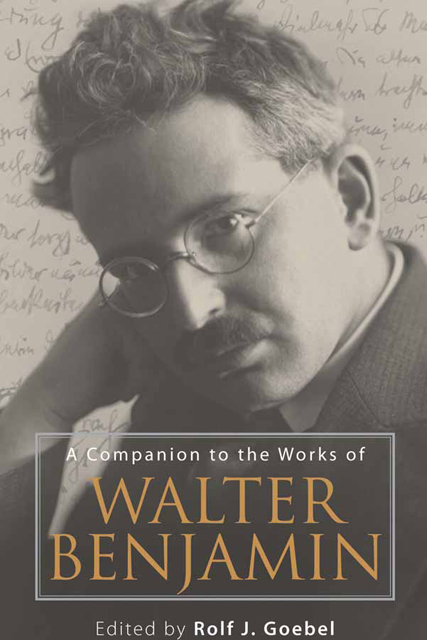Book contents
- Frontmatter
- Contents
- Preface
- Sources of Benjamin’s Works
- Chronology of Benjamin’s Major Works
- Introduction: Benjamin’s Actuality
- 1 Walter Benjamin's Criticism of Language and Literature
- 2 The Presence of the Baroque: Benjamin’s Ursprung des deutschen Trauerspiels in Contemporary Contexts
- 3 Lost Orders of the Day: Benjamin's Einbahnstraße
- 4 Literature as the Medium of Collective Memory: Reading Benjamin’s Einbahnstraße, “Der Erzähler,” and “Das Paris des Second Empire bei Baudelaire”
- 5 Benjamin in the Age of New Media
- 6 One Little Rule: On Benjamin, Autobiography, and Never Using the Word “I”
- 7 The Passagen-Werk Revisited: The Dialectics of Fragmentation and Reconfiguration in Urban Modernity
- 8 Benjamin’s Politics of Remembrance: A Reading of “Über den Begriff der Geschichte”
- 9 The Legacy of Benjamin’s Messianism: Giorgio Agamben and Other Contenders
- 10 Paris on the Amazon? Postcolonial Interrogations of Benjamin’s European Modernism
- 11 Benjamin’s Gender, Sex, and Eros
- 12 Sonic Dreamworlds: Benjamin, Adorno, and the Phantasmagoria of the Opera House
- Select Bibliography and List of Further Reading
- Notes on the Contributors
- Index
7 - The Passagen-Werk Revisited: The Dialectics of Fragmentation and Reconfiguration in Urban Modernity
Published online by Cambridge University Press: 28 February 2023
- Frontmatter
- Contents
- Preface
- Sources of Benjamin’s Works
- Chronology of Benjamin’s Major Works
- Introduction: Benjamin’s Actuality
- 1 Walter Benjamin's Criticism of Language and Literature
- 2 The Presence of the Baroque: Benjamin’s Ursprung des deutschen Trauerspiels in Contemporary Contexts
- 3 Lost Orders of the Day: Benjamin's Einbahnstraße
- 4 Literature as the Medium of Collective Memory: Reading Benjamin’s Einbahnstraße, “Der Erzähler,” and “Das Paris des Second Empire bei Baudelaire”
- 5 Benjamin in the Age of New Media
- 6 One Little Rule: On Benjamin, Autobiography, and Never Using the Word “I”
- 7 The Passagen-Werk Revisited: The Dialectics of Fragmentation and Reconfiguration in Urban Modernity
- 8 Benjamin’s Politics of Remembrance: A Reading of “Über den Begriff der Geschichte”
- 9 The Legacy of Benjamin’s Messianism: Giorgio Agamben and Other Contenders
- 10 Paris on the Amazon? Postcolonial Interrogations of Benjamin’s European Modernism
- 11 Benjamin’s Gender, Sex, and Eros
- 12 Sonic Dreamworlds: Benjamin, Adorno, and the Phantasmagoria of the Opera House
- Select Bibliography and List of Further Reading
- Notes on the Contributors
- Index
Summary
SINCE ITS PUBLICATION IN 1982 Walter Benjamin's Passagen-Werk (The Arcades Project) has become an essential compendium of nineteenthcentury modernism in European intellectual history and an exhaustive though fragmentary inquiry into the emergence of bourgeois urban culture between the Revolution of 1830 and the Paris Commune in 1871. Compiled in the years between 1927 and the Nazi invasion of France in 1940, the material the German-Jewish cultural critic drew together laid the groundwork for what was to have been a definitive monograph on Paris during the central decades of the nineteenth century. Transforming geographic space into a matrix of text, Benjamin explores the reconfiguration of early contemporary cityscapes and maps out an allegorical blueprint for bourgeois cultural memory. True to the encyclopedic spirit of his analysis, the doctrine of historical materialism he championed, and his passion for accruing written artifacts like shards at an archaeological dig, Benjamin noted: “Geschichte schreiben heißt, Jahreszahlen ihre Physiognomie zu geben. (“to write history means giving dates their physiognomy,” N11,2) or, more simply, writing history is citing history. “Ihre Theorie,” Benjamin observes, “hängt aufs engste mit der Montage zusammen” (“its theory is intimately related to that of montage,” N1,10). Interweaving excerpts from 850 secondary sources with original commentaries, observations, and glosses, the author substantiates how changes to urban existence were mirrored in the surfaces, façades, and contours of a rapidly evolving metropolis. In particular, new technologies impacted communal sites, and these came to embody collective memory and public visions in Paris, “the capital of the nineteenth century.” “Es ist das Eigentümliche der technischen Gestaltungsformen (im Gegensatz zu den Kunstformen),” he asserts, “daß ihr Fortschritt und ihr Gelingen der Durchsichtigkeit ihres gesellschaftlichen Inhalts proportional sind” (“It is the peculiarity of technological forms of production — as opposed to art forms — that their progress and their success are proportionate to the transparency of their social content,” N4,6). The arcades, glass-covered shopping and bourgeois recreation areas, became testimonies for a discernible moment in the continuum of European cultural history. Their decline or disappearance at the time that Benjamin began to chronicle their significance not only points to a historical index but also heralds the passing of nineteenth-century collective memory as the twentieth century began to encroach on the cityscape.
- Type
- Chapter
- Information
- A Companion to the Works of Walter Benjamin , pp. 153 - 176Publisher: Boydell & BrewerPrint publication year: 2009



